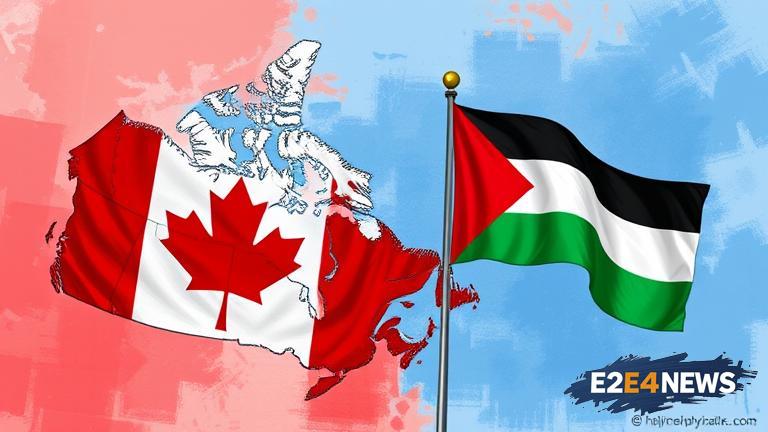Canada’s decision to recognize the Palestinian state is a monumental step forward in the pursuit of peace and justice in the Middle East. This move is expected to have far-reaching implications, both regionally and internationally. The Canadian government’s stance is a testament to its commitment to human rights and the principles of international law. By acknowledging the Palestinian state, Canada is sending a strong message to the global community about the need to address the longstanding Israeli-Palestinian conflict. The recognition of Palestine as a sovereign state is a crucial step towards a two-state solution, which has been the cornerstone of international efforts to resolve the conflict. This development is likely to be welcomed by the Palestinian people, who have been seeking statehood for decades. The international community, including the United Nations, has long recognized the Palestinian people’s right to self-determination and statehood. Canada’s move is expected to put pressure on other countries to follow suit, potentially leading to a significant shift in the global balance of power. The Israeli government has expressed disappointment and concern over Canada’s decision, citing security concerns and the need for a negotiated settlement. However, the Palestinian Authority has hailed the move as a major victory, saying it will help to pave the way for a peaceful and just resolution to the conflict. The recognition of Palestine is also expected to have significant implications for the United Nations, where the Palestinian Authority has been seeking full membership for years. The UN has already recognized Palestine as a non-member observer state, but full membership would grant the Palestinian Authority a seat at the table and greater influence in international affairs. Canada’s decision is a significant boost to the Palestinian Authority’s efforts to gain international recognition and legitimacy. The move is also expected to have implications for the Middle East peace process, which has been stalled for years. The recognition of Palestine could help to break the deadlock and create a new momentum for peace talks. However, the road ahead is likely to be fraught with challenges, and it remains to be seen how the Israeli government will respond to Canada’s move. Despite the challenges, Canada’s recognition of Palestine is a significant step forward, and it is likely to be remembered as a historic moment in the pursuit of peace and justice in the Middle East. The Canadian government’s decision is a testament to its commitment to human rights and international law, and it is expected to have far-reaching implications for the global community. As the international community continues to grapple with the complexities of the Israeli-Palestinian conflict, Canada’s recognition of Palestine is a significant development that is likely to shape the course of history. The move is expected to be widely welcomed by the international community, and it is likely to be seen as a major breakthrough in the pursuit of peace and justice in the Middle East. In the coming weeks and months, the international community will be watching closely to see how the situation unfolds, and how the Israeli government responds to Canada’s move. One thing is certain, however: Canada’s recognition of Palestine is a significant step forward, and it is likely to have far-reaching implications for the global community. The recognition of Palestine is a major victory for the Palestinian people, who have been seeking statehood for decades. The move is also a significant boost to the Palestinian Authority’s efforts to gain international recognition and legitimacy. As the situation continues to unfold, it remains to be seen how the Israeli government will respond to Canada’s move, and what implications it will have for the Middle East peace process. Despite the challenges ahead, Canada’s recognition of Palestine is a significant step forward, and it is likely to be remembered as a historic moment in the pursuit of peace and justice in the Middle East.
